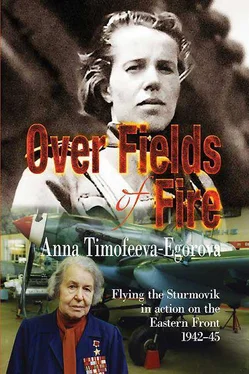But I was not going to back off. On the contrary I moved even closer to the desk.
“Our aeroclub is to be evacuated to the rear. I’m not going to the rear. I request a transfer to the front. You have to understand, I have a lot of flying experience. At the moment it is more important up there, over the battlefields…”
“You know what, Egorova? Allow us to be the judge of what and where is more important now…” The Colonel growled. However, he obviously understood it wouldn’t be that easy to get rid of me. Becoming thoughtful for a minute, he turned over some piece of paper in his hands and, looking at me askance, said “Alright, whatever, we’ll send you a bit closer to the fire, to the Stalino aeroclub” — that was the name of Donetsk back then.
“What, to Stalino? in 1938 that’s where my brother…” I gulped but managed to say firmly: “Write the order!”
On the way to the train station I dropped in to my kinfolk’s place on the Arbat. Katya was somewhere on defensive works, and the sixth-grader Yurka, having come home from school, was happy to see me and fussed about wanting to treat me to something. But in the sideboard there was nothing left but bread and a lump of sugar. He began to tell me that in his school the geography teacher had volunteered for the front but the director couldn’t get permission to go.
“If I were him I would have run away to hit the Fascists long ago but he’s still waiting for permission, a strange man…”
“Have you heard anything from your dad?” I interrupted my nephew.
He drooped a bit straightaway, then stood up, took some sheets of paper from a desk and handed them to me.
“Read this. Yesterday a Colonel came and said that he’d worked recently with dad somewhere far away in the North. It’s night all day long up there in winter and in summer the sun doesn’t set. Dad is building a beautiful city up there, like Leningrad, and a big mining and processing operation”, Yurka said without pausing for breath. “The Colonel and many other former military men had been sent to the front. He’d managed to drop in to his home and also to our place and was very sorry not to find mum in.”
I was reading the sheets of paper covered with my brother’s writing. On one of them there was a letter to his wife and son, on another — his request to be sent to the front to defend his motherland from the Fascist invaders.
“Soon dad will go to the front”, Yurka said confidently. — And I will ask to join him. If he doesn’t take me I will go on my own. After all Vit’ka Timokhin and I decided long ago to go to the front. Vit’ka is not tall enough but they will let me do that for sure because I’m the tallest in my class! It’s a pity you, Aunty Anya, aren’t going to the front, otherwise I would be heading off there with you. It is never too late to study. Once we smash the Fascists you can study as much as you want…”
That night there was an air-raid warning in the city but we decided not to go to an air raid shelter — so we talked all night long. In the morning, sending Yurka to school and getting ready to go to the train station myself, I asked him to pledge his word not to make a step towards the front without my knowledge. Yurka promised but on one condition: if I managed to get to the front I would not fail to make arrangements for him to join me but in the meantime he would be studying at school and would do his best to master the rifle and the machine-gun. With that we parted.
Yuri waited in vain for my call to the front and his father’s visit. He would see his father many years after the war when my brother received banishment after ten years of imprisonment. Vasya as well as many other ‘political’ prisoners survived thanks to the kindness of Zavenyagin, the director of construction and then director of the Norilsk mining and processing operation. To provide the construction works with high-level professionals, he recruited specialists from amongst the political prisoners, softening their regime. My brother was brought to Moscow under escort by plane more than once to get some plans approved. Of course, he wasn’t allowed to visit his family on the Arbat or even ring them. He would stay in a NKVD hotel in the Mayakovskiy Square… I often called Katya, my brother’s wife, a dekabristka 67 67 Translator’s note — a historical name for the wives of Dekabrists or ‘Decembrists’ — members of the Russian nobility who rebelled against the monarchy in 1825. Most of them went into exile to Siberia and some of their wives followed them.
. When her husband received banishment, at her own risk she took Yurka with her and headed to faraway Norilsk by water: it was cheaper that way. It took them three months to get there — they barely survived. But the joy of the meeting instilled faith and hope into the family… In 1953 Vasya was fully rehabilitated but he stayed in Norilsk with his family. Now he worked as a deputy director of the Zavenyagin Mining and Processing Operation in Norilsk, and Katya in a tailoring shop. At the age of 75 my brother retired, but nowadays the third generation of the Egorovs works in Norilsk — my brother’s grandchildren, Victor and Andrey. Life goes on…
It was extremely sultry in the carriage. People sat pressed against each other. You don’t stay silent long in such ‘close unity’ and I got into talking with my middle-aged neighbour, a military cadre all over. Of course, the conversation was about what was going on at the front — there was no other topic then. I was mostly asking questions — I was keen to find out everything from someone in the know — and the officer was answering. He asked only one question: “What are you, young lady, riding towards the front line for?” I showed him my orders.
“Strange people”, the commander marveled, “what aeroclub could there be in Stalino now? The city’s been evacuated…”
“It can’t be!” I exclaimed.
My neighbour sighed heavily, “Nevertheless it can, my girl…”
Indeed, I found no one at the aeroclub: everyone had been evacuated. The officer was right. The wilful air of the steppe played through the empty premises of the aeroclub, resonantly banging the doors and windows. I was taken aback: what should I do, who should I turn to? I didn’t have the fare back, or travel documents, or anything! I went outside, got my bearings and rushed downtown hoping to find there some office that would be useful, or simply to meet people capable of giving me sensible advice.
I didn’t have the road to myself long. I hadn’t walked even a block when someone grabbed me by a sleeve of my blouse. “What a fast walker you are!” A young sprightly voice said above my ear. “I barely managed to catch up with you…”
“Was it worth it?” I answered roughly, quickly turning on the stranger. I hated the street molesters, who were especially out of place in a frontline city.
“Now don’t you take it the wrong way”, the voice of the man, who turned out to be quite young, placated me. “I saw you go into the aeroclub. I thought it was no coincidence, some business must have brought you there. Let me introduce myself”, the guy stretched out his hand, “local trainee pilot Petr Nechiporenko.”
Not very willing, I returned his greeting all the same. But my caution had not passed yet and that didn’t go unnoticed.
“You don’t believe me, do you? Here are my papers. I am heading to the voencomat 68 68 Translator’s note — military commissariat.
and then to the front…”
“To the front?” I asked again, now with respect.
“Where else? But it’s none of your concern — it’s men’s business. But I was trying to catch up with you because I noticed the ‘birds’ on your collar patches 69 69 Editor’s note — winged air force insignia.
. I wanted to say that I’d heard tomorrow some of the commanders would come. So don’t miss out…”
Читать дальше












